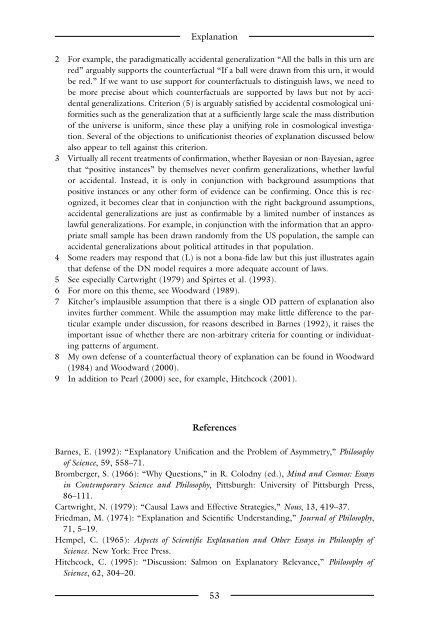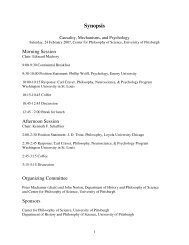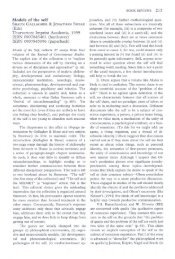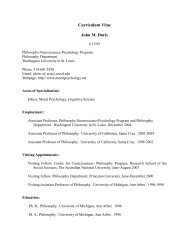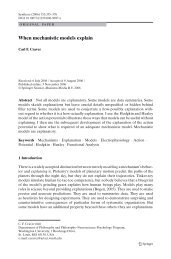The Blackwell Guide to the Philosophy of Science - The Department ...
The Blackwell Guide to the Philosophy of Science - The Department ...
The Blackwell Guide to the Philosophy of Science - The Department ...
You also want an ePaper? Increase the reach of your titles
YUMPU automatically turns print PDFs into web optimized ePapers that Google loves.
Explanation<br />
2 For example, <strong>the</strong> paradigmatically accidental generalization “All <strong>the</strong> balls in this urn are<br />
red” arguably supports <strong>the</strong> counterfactual “If a ball were drawn from this urn, it would<br />
be red.” If we want <strong>to</strong> use support for counterfactuals <strong>to</strong> distinguish laws, we need <strong>to</strong><br />
be more precise about which counterfactuals are supported by laws but not by accidental<br />
generalizations. Criterion (5) is arguably satisfied by accidental cosmological uniformities<br />
such as <strong>the</strong> generalization that at a sufficiently large scale <strong>the</strong> mass distribution<br />
<strong>of</strong> <strong>the</strong> universe is uniform, since <strong>the</strong>se play a unifying role in cosmological investigation.<br />
Several <strong>of</strong> <strong>the</strong> objections <strong>to</strong> unificationist <strong>the</strong>ories <strong>of</strong> explanation discussed below<br />
also appear <strong>to</strong> tell against this criterion.<br />
3 Virtually all recent treatments <strong>of</strong> confirmation, whe<strong>the</strong>r Bayesian or non-Bayesian, agree<br />
that “positive instances” by <strong>the</strong>mselves never confirm generalizations, whe<strong>the</strong>r lawful<br />
or accidental. Instead, it is only in conjunction with background assumptions that<br />
positive instances or any o<strong>the</strong>r form <strong>of</strong> evidence can be confirming. Once this is recognized,<br />
it becomes clear that in conjunction with <strong>the</strong> right background assumptions,<br />
accidental generalizations are just as confirmable by a limited number <strong>of</strong> instances as<br />
lawful generalizations. For example, in conjunction with <strong>the</strong> information that an appropriate<br />
small sample has been drawn randomly from <strong>the</strong> US population, <strong>the</strong> sample can<br />
accidental generalizations about political attitudes in that population.<br />
4 Some readers may respond that (L) is not a bona-fide law but this just illustrates again<br />
that defense <strong>of</strong> <strong>the</strong> DN model requires a more adequate account <strong>of</strong> laws.<br />
5 See especially Cartwright (1979) and Spirtes et al. (1993).<br />
6 For more on this <strong>the</strong>me, see Woodward (1989).<br />
7 Kitcher’s implausible assumption that <strong>the</strong>re is a single OD pattern <strong>of</strong> explanation also<br />
invites fur<strong>the</strong>r comment. While <strong>the</strong> assumption may make little difference <strong>to</strong> <strong>the</strong> particular<br />
example under discussion, for reasons described in Barnes (1992), it raises <strong>the</strong><br />
important issue <strong>of</strong> whe<strong>the</strong>r <strong>the</strong>re are non-arbitrary criteria for counting or individuating<br />
patterns <strong>of</strong> argument.<br />
8 My own defense <strong>of</strong> a counterfactual <strong>the</strong>ory <strong>of</strong> explanation can be found in Woodward<br />
(1984) and Woodward (2000).<br />
9 In addition <strong>to</strong> Pearl (2000) see, for example, Hitchcock (2001).<br />
References<br />
Barnes, E. (1992): “Explana<strong>to</strong>ry Unification and <strong>the</strong> Problem <strong>of</strong> Asymmetry,” <strong>Philosophy</strong><br />
<strong>of</strong> <strong>Science</strong>, 59, 558–71.<br />
Bromberger, S. (1966): “Why Questions,” in R. Colodny (ed.), Mind and Cosmos: Essays<br />
in Contemporary <strong>Science</strong> and <strong>Philosophy</strong>, Pittsburgh: University <strong>of</strong> Pittsburgh Press,<br />
86–111.<br />
Cartwright, N. (1979): “Causal Laws and Effective Strategies,” Nous, 13, 419–37.<br />
Friedman, M. (1974): “Explanation and Scientific Understanding,” Journal <strong>of</strong> <strong>Philosophy</strong>,<br />
71, 5–19.<br />
Hempel, C. (1965): Aspects <strong>of</strong> Scientific Explanation and O<strong>the</strong>r Essays in <strong>Philosophy</strong> <strong>of</strong><br />
<strong>Science</strong>. New York: Free Press.<br />
Hitchcock, C. (1995): “Discussion: Salmon on Explana<strong>to</strong>ry Relevance,” <strong>Philosophy</strong> <strong>of</strong><br />
<strong>Science</strong>, 62, 304–20.<br />
53


